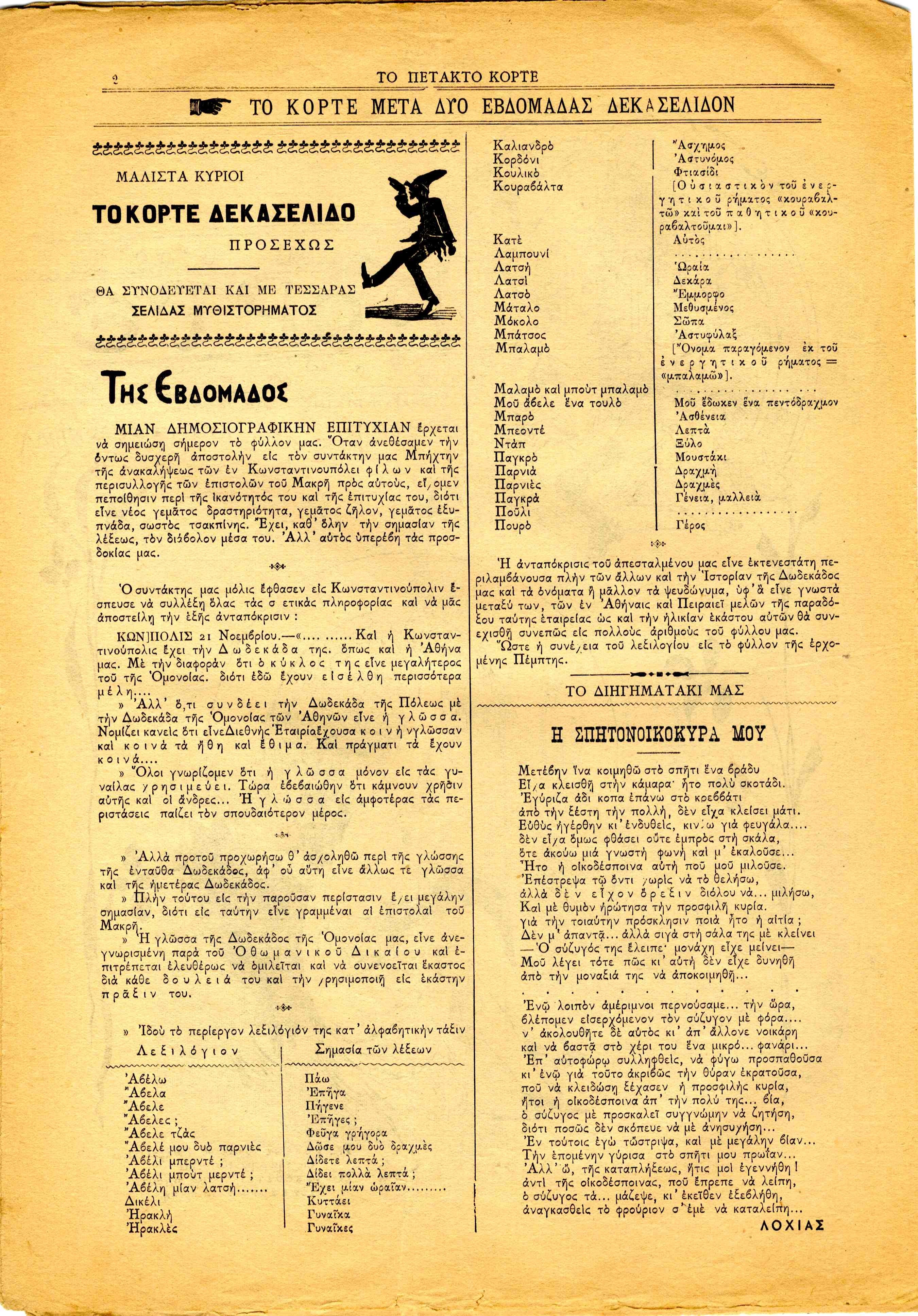Subscribe to Blog via Email
Join 329 other subscribersFebruary 2026 M T W T F S S 1 2 3 4 5 6 7 8 9 10 11 12 13 14 15 16 17 18 19 20 21 22 23 24 25 26 27 28
Kaliarda XXIX: 1904, addendum
I just noted that Nikos Sarantakos posted on his blog a report on the 1904 attestation of Kaliarda. I neglected to mention that he posted a full scan of the 1904 article (1904–11–25), which includes a couple of paragraphs left out in Spatholouro’s transcription, which I’d previously posted here.

“Our journal is able to announce a journalistic success today. When we gave the truly difficult mission to our contributor Bichtis [“Pest, Sexual Harrasser”] of discovering the friends in Constantinople and collecting Makris’ correspondence towards them, we were convinced of his capability and his success, for he is a young man full of energy, zeal, and smarts, a proper spitfire. He literally has the devil inside. But he has exceeded our expectation.”
- The “friends” are obviously queers in Istanbul. (I really should have been using that term instead of “gays” all along.)
- I have no idea who Makris was, and what his correspondence involved, but there may be hints of it in previous issues of the magazine.
“Constantinople, 21 November. … Constantinople too has her Twelve, just like our Athens. The difference is that her circle is larger than the Omonia Square one, for more members have entered it here.”
- Why yes, some of those italics are deliberate. The whole magazine did that, not just this article.
- The reference to the Twelve, this confirms, is purely conventional (“Council of Elders = Queers”), since in fact there are numerically more queers in Istanbul than Athens.
“We all know that (the) language/tongue is only useful for women. Now it is confirmed that men use it too. Language/Tongue in both cases plays the major part.”
- I initially thought this was indirect confirmation that Kaliarda was already familiar as the language of cis female prostitutes. But in context, it’s likely just some artless sexism plus a double entendre: “Women are all talk (tongue); but it turns out (queer) men can use their tongues for the same purpose as women. Why no, I was just referring to the use of language by both! Get your mind out of the gutter!”
“Before going further I will write on the language of the Twelve here [in Constantinople], since this is the same language as that of our Twelve [in Athens]. This is also quite important in our case, as that is what Makris’ letters are written in.”
- Again, the explicit identification of Athens Lubinistika from 1904 with Istanbul Lubunca; and the old Italian vocabulary which differentiates the two is not included in the glossary.
“The report of our correspondent is quite detailed, including among others the history of our Twelve and the names, or rather pseudonyms, by which the Athens and Peiraeus members of this curious company are known, along with the age of each; we will be continuing it in many issues of our magazine.”
- And indeed, while the following issue (1904–12–02) is missing from the Greek National Library and the ΕΛΙΑ press archives, the issue after that, 1904–12–09, did publish names of the “Twelve in Peiraeus”; I already noted the presence of masculine, feminine and neuter names, in contrast with the exclusively feminine names reported for 1971 by Petropoulos.
- The 1904–12–16 issue left out its report on “The Twelve” for lack of space; the issue after that, 1904–12–23, is likewise missing from ΕΛΙΑ. The 1904–12–09 issue likely has a few more gems though.
Μάλλον λόγω σεμνοτυφίας, η ΑΤΛΑΝΤΙΣ ευπρέπισε το πρωτότυπο κείμενο της εισήγησης του Νικ. Λάσκαρη στον Καλοκαιρίνειο Διαγωνισμό. Η αθηναϊκή εφημερίδα ΑΘΗΝΑΙ στις 5/6/1925 δημοσιεύει επακριβώς το κείμενο της εισήγησης, όπου το παράθεμα που μας ενδιαφέρει είναι το εξής: «Η πάγκαλος ελληνική γλώσσα αντικατεστάθη διά των αργκό των χασισοποτών και της άλλης βρωμεράς διαλέκτου των πυγοστόλων νεανιών των περιφερομένων κατά τας νυκτερινάς ώρας επί της πλατείας της ομονοίας και υπό τα βαθύσκια φυλλώματα του κήπου του Ζαπείου».
Οπότε το εν λόγω παράθεμα πιθανολογώ ότι μας επιτρέπει να υποθέσουμε ότι στη δεκαετία του 1920, από θεατρικής σκηνής, εκτός από φράσεις από τη συνθηματική γλώσσα των χασισοποτών, ακούγονταν και κάποια «λουμπινίστικα»/καλιαρντά…
spatholouro
Και μία διαμαρτυρία από το 1925 για την ανύπαρκτη ποιότητα της ποιητικής και θεατρικής τέχνης, αλλά και για την πάγκαλον ελληνική γλώσσα που «αντικατεστάθη διά των αργκώ των χασισοποτών και της άλλης βρωμεράς διαλέκτου των ασυστόλων νεανιών…»
(ΑΤΛΑΝΤΙΣ, 4/7/1925)
Nick, για κοίτα κι εδώ περί Δωδεκάδος, με αφορμή τους Φίφτυ-Του (ΑΚΡΟΠΟΛΙΣ 12/3/1908)
https://srv-web1.parliament.gr/main.asp?current=306236
spatholouro (και για την αντιγραφή: Κώστας Βλησίδης)